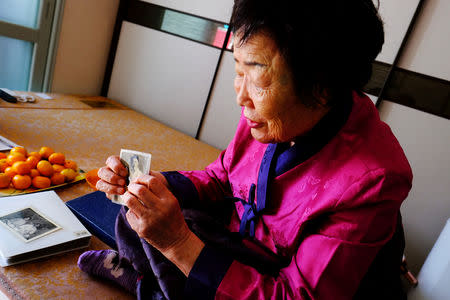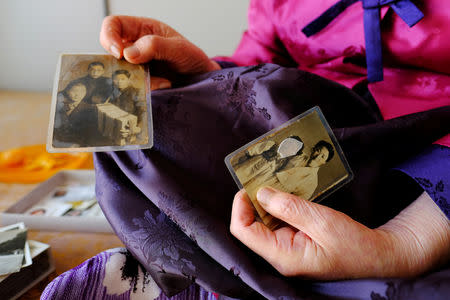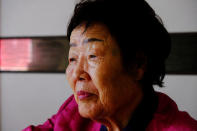South Korea's surviving 'comfort women' spend final years seeking atonement from Japan
By Josh Smith and Haejin Choi
DAEGU, South Korea (Reuters) - When 17-year-old Lee Yong-soo returned home to South Korea in 1945 after being forced to serve in a brothel for Japanese troops, her family, having given her up for dead, thought she was a ghost.
"When I returned, I had a deep wound," Lee told Reuters, holding a black and white photo of herself in a traditional Korean dress, taken in her first year back home.
She still remembers the blue and purple fabric of that dress, but other memories from those years are more traumatic.
"I thought I was going to die," Lee said of the abuse and torture she endured in a brothel at an airfield in Taiwan used by Japanese kamikaze pilots in the final years of World War Two.
Now 90 years old, Lee says she feels like a sincere apology from Japanese authorities for the wartime exploitation of so-called “comfort women” is no nearer now than when she returned home more than 70 years ago.
Japan says the claims have been settled by past agreements and apologies, and that the continued controversy threatens relations between the two countries.
Some historians estimate 30,000 to 200,000 Korean women were forced into prostitution during Japan's occupation from 1910 to 1945, in some cases under the pretext of employment or to pay off a relative's debt.
The term “comfort women” is a wartime euphemism translated from Japanese for the women, many from Korea, who were forced into prostitution and sexually abused at Japanese military brothels before and during World War Two.
A 1996 UN human rights report concluded that the women had been “military sexual slaves”. Japan contests that finding, and a 2015 compensation agreement between Japan and South Korea did not address the issue of whether coercion of the women was a policy of imperial Japan.
Now with only 25 registered South Korean survivors still alive, there is a sense of urgency behind efforts by the women to receive a formal apology as well as legal compensation from Japan while their voices can still be heard.
Just days before Reuters interviewed Lee at her one-room apartment in the southern city of Daegu, a fellow victim had died, one of eight so far in 2018.
Another survivor, Kim Bok-dong, said she wanted to share her story, but suffering from cancer and expected to live only a few more months, she was unable to find time to speak.
"SINCERE APOLOGY"
Under the 1965 treaty, Japan reached a deal with South Korea to provide an $800 million aid-and-loan package in exchange for Seoul considering all wartime compensation issues settled.
A South Korean panel late last year concluded the 2015 deal between South Korea and Japan had failed to meet the needs of former "comfort women".
Acting on that conclusion, the South Korean government this week shut down a fund created under the 2015 deal and vowed to pursue a more "victim-oriented" approach, a move Japan said threatened the two countries' relations.
A sense of shame and secrecy meant most tales of abuse and coercion at the brothels for Japanese troops were never discussed publicly, until Kim Hak-sun, one of the South Korean victims, came forward in 1991.
She and two other former comfort women joined a class action lawsuit against Japan, which prompted the Japanese government to acknowledge its role for the first time in 1993. The case was eventually dismissed by Japan's highest courts in 2004.
Lee was one of the survivors emboldened by Kim's move, and has since worked to raise awareness, including meeting the Pope and travelling to North Korea to meet other victims.
"Since 1992, I had been asking Japan to make sincere apology, that is what I want," Lee said. "I have been doing this for 27 years, it doesn’t matter whether it was raining or snowing, or the weather was cold or hot."
UNRESOLVED DISPUTE
From 1995 to 2007, Japan created a fund from donations to make payments to women throughout Asia, budgeted money for their welfare support and sent letters of apology from successive premiers.
While a number of survivors have accepted compensation over the years, many South Koreans see the issue as unresolved because of what they consider a lack of sincerity from the Japanese government.
Despite apologies from Japan, for example, the first comfort women fund was criticised in South Korea for not being direct compensation from the state, and the 2015 deal was faulted for failing to include a clear statement of the Japanese government’s legal responsibility.
Japan says South Korea had waived all claims in the 1965 pact, and that under the 2015 deal, Japan agreed to provide the funds to help the women heal "psychological wounds".
Critics of South Korea have also accused it of ignoring the complicity of some Koreans in the sex trade at the time.
Shutting the Japan-funded foundation is one of the most significant steps President Moon Jae-in's administration has taken as it revisits the comfort women controversy.
In the past year, South Korea has also opened a new research centre aimed at consolidating academic study of comfort women, named the first Comfort Women Day and unveiled a new memorial in Cheonan, a city south of Seoul.
"We cannot ignore the truth just because it hurts," Moon said this week. "For the sake of sustainable and solid Korea-Japan relations, we must face up to the truth.”
Lee said she thinks Moon is "trying his best," and in a statement released from her hospital bed this week, Kim said the move to close the foundation restored her trust in the South Korean president.
Moon's efforts, however, have faced pushback from Japanese officials, including Prime Minister Shinzo Abe.
Earlier this year, Japan formally complained after South Korea’s foreign minister raised the issue in a speech at the United Nations.
Japanese officials have expressed frustration at what they see as the South Korean government's changing positions and efforts to revisit settled agreements.
For survivors like Lee, Japan's protests ring hollow.
Lee said she was 16 when she was forcibly taken to Taiwan by a Japanese man in a “sort of military uniform”. When she first balked at entering the brothel, she said she was beaten and tortured with electric shocks. She was released in 1945, after about two years as a captive.
"The survivors of the heinous crimes the Japanese committed are dying day by day, and I bet Abe is dancing for joy," Lee said, becoming animated as she described her frustration. "They should apologise, tell the truth, and pay the legal compensation."
(Reporting by Josh Smith and Haejin Choi.; Additional reporting by Linda Sieg in Tokyo.; Editing by Lincoln Feast.)

 Yahoo News
Yahoo News 








